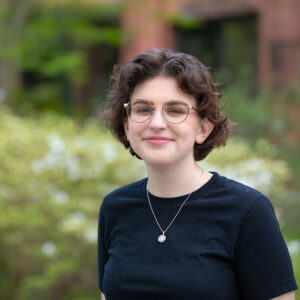Liz Alpern is known throughout New York and the world as a founder of Gefilteria, “a cutting-edge food venture” that brings old-world Ashkenazi cuisine to a broad audience.
Before that, though, Alpern was a young publisher of New Voices, just as the magazine was beginning to grow a following online.
Alpern says that her work at New Voices paved the way for her eventual career in borscht and babke. “I was really empowered to follow my own path and do what I needed to do. That kind of, getting thrown right into the fire, and trusting your gut…helped me later on my entrepreneurial career path.”
After leaving New Voices, Alpern got her first job in the food world through a New Voices contributor whose mother happened to be Joan Nathan, a well-known Jewish cookbook author.
Then, Alpern found her real calling: Gefilteria. She had been feeling that traditional Jewish food was not taken seriously or even recognized in the larger culinary world.
“Frankly it felt very urgent – it felt like nobody in my generation really cared about Jewish food, and when I found someone who shared my passion [co-founder Jeffrey Yoskowitz], we launched it in 2012,” Alpern said.
In Alpern’s generation, many of her Ashkenazi Jewish peers had never learned how to make their families’ traditional foods, in large part due to the pressures of assimilation. “Their grandmothers cooked them, maybe, but their parents didn’t and they never learned,” Alpern explained. Ashkenazi foods were left with a distinctly non-modern reputation, relegated to the status of bubbe’s things, not relevant to current Jewish culture or identity.
However, when Alpern launched Gefilteria, it was a runaway success, as was her first cookbook, “The Gefilte Manifesto.” Alpern says the book resonated with many people and often helped them experience dishes that they hadn’t tasted since childhood.
For Alpern, food is a crucial way of connecting to identity. “I think we’re all healthier and happier people when we’re grounded in our identity and in our community – that’s just a fundamental truth of human existence,” she said. “And so for me, it was a need to be able to connect to my history and my culture as an Ashkenazi Jew…as opposed to feeling like we have no place in our history, or we have no place where we come from.”
In addition to using food to connect to generations of Jews past, Alpern also uses cooking to bring together queer communities across the country.
In the wake of Donald Trump’s election in 2016, as LGBTQ+ communities faced uncertain futures, Alpern started “Queer Soup Night,” a series of gatherings for queers and friends to eat soup and share love. Every event donates proceeds to a local social justice organization.
By Alpern’s count, Queer Soup Nights (which, like so many things, started in Brooklyn and spread across the country) have raised about $60,000 for grassroots groups.
Soup, to Alpern, is one of the best ways to build community, because it is a profoundly accessible – and nourishing – food. “I love soup, I always have…and, crucially, it’s the kind of food you can make in large quantities without it being too expensive. It’s also a humble kind of food – even if it’s really high-quality. It’s friendly, it’s welcoming. It’s a comfort food, and no matter what culture you’re from, soup is often the thing you eat when you’re sick, or the thing you eat on cold nights.”
Queer Soup Night is also a way for people to express their own cultures, and the stories that their foods and their families carry. “We love when our chefs make soups that tell a story about where they’re from, because this gives them a platform to tell that story,” Alpern said.
In the future, Alpern hopes that more people will be able to express their stories through food. “I’m out there preaching about Ashkenazi Jewish food, which is a hyper-specific kind of Jewish cooking, so I love seeing all the other types of Jewish cooking out there – whether it’s Ethiopian Jewish cooking, or Persian Jewish cooking, or Sephardic Jewish cooking…I love when young people are coming into the culinary world and talking about those other cuisines, because what the Jewish food landscape really should look like is a global food landscape. The more diversity we see, the better.”
Featured image credit: https://gefilteria.com/past-projects/

